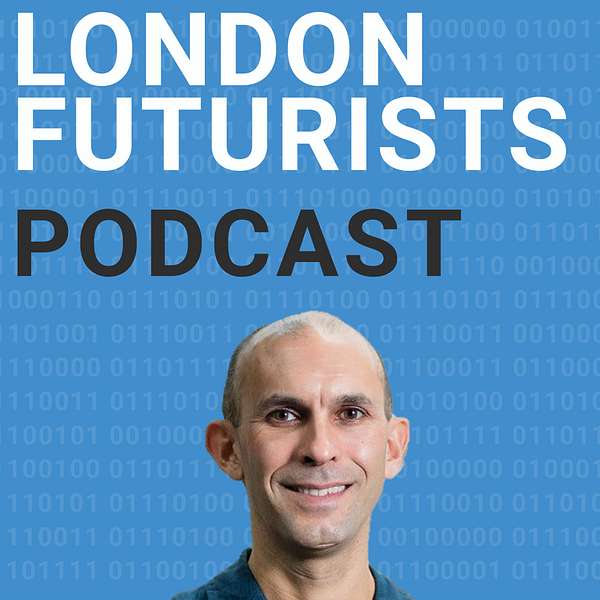
London Futurists
Anticipating and managing exponential impact - hosts David Wood and Calum Chace
Calum Chace is a sought-after keynote speaker and best-selling writer on artificial intelligence. He focuses on the medium- and long-term impact of AI on all of us, our societies and our economies. He advises companies and governments on AI policy.
His non-fiction books on AI are Surviving AI, about superintelligence, and The Economic Singularity, about the future of jobs. Both are now in their third editions.
He also wrote Pandora's Brain and Pandora’s Oracle, a pair of techno-thrillers about the first superintelligence. He is a regular contributor to magazines, newspapers, and radio.
In the last decade, Calum has given over 150 talks in 20 countries on six continents. Videos of his talks, and lots of other materials are available at https://calumchace.com/.
He is co-founder of a think tank focused on the future of jobs, called the Economic Singularity Foundation. The Foundation has published Stories from 2045, a collection of short stories written by its members.
Before becoming a full-time writer and speaker, Calum had a 30-year career in journalism and in business, as a marketer, a strategy consultant and a CEO. He studied philosophy, politics, and economics at Oxford University, which confirmed his suspicion that science fiction is actually philosophy in fancy dress.
David Wood is Chair of London Futurists, and is the author or lead editor of twelve books about the future, including The Singularity Principles, Vital Foresight, The Abolition of Aging, Smartphones and Beyond, and Sustainable Superabundance.
He is also principal of the independent futurist consultancy and publisher Delta Wisdom, executive director of the Longevity Escape Velocity (LEV) Foundation, Foresight Advisor at SingularityNET, and a board director at the IEET (Institute for Ethics and Emerging Technologies). He regularly gives keynote talks around the world on how to prepare for radical disruption. See https://deltawisdom.com/.
As a pioneer of the mobile computing and smartphone industry, he co-founded Symbian in 1998. By 2012, software written by his teams had been included as the operating system on 500 million smartphones.
From 2010 to 2013, he was Technology Planning Lead (CTO) of Accenture Mobility, where he also co-led Accenture’s Mobility Health business initiative.
Has an MA in Mathematics from Cambridge, where he also undertook doctoral research in the Philosophy of Science, and a DSc from the University of Westminster.
London Futurists
What’s it like to be an AI, with Anil Seth
As artificial intelligence models become increasingly powerful, they both raise - and might help to answer - some very important questions about one of the most intriguing, fascinating aspects of our lives, namely consciousness.
It is possible that in the coming years or decades, we will create conscious machines. If we do so without realising it, we might end up enslaving them, torturing them, and killing them over and over again. This is known as mind crime, and we must avoid it.
It is also possible that very powerful AI systems will enable us to understand what our consciousness is, how it arises, and even how to manage it – if we want to do that.
Our guest today is the ideal guide to help us explore the knotty issue of consciousness. Anil Seth is professor of Cognitive and Computational Neuroscience at the University of Sussex. He is amongst the most cited scholars on the topics of neuroscience and cognitive science globally, and a regular contributor to newspapers and TV programmes.
His most recent book was published in 2021, and is called “Being You – a new science of consciousness”.
The first question sets the scene for the conversation that follows: "In your book, you conclude that consciousness may well only occur in living creatures. You say 'it is life, rather than information processing, that breathes the fire into the equations.' What made you conclude that?"
Selected follow-ups:
- Anil Seth's website
- Books by Anil Seth, including Being You
- Consciousness in humans and other things - presentation by Anil Seth at The Royal Society, March 2024
- Is consciousness more like chess or the weather? - an interview with Anil Seth
- Autopoiesis - Wikipedia article about the concept introduced by Humberto Maturana and Francisco Varela
- Akinetic mutism, Wikipedia
- Cerebral organoid (Brain organoid), Wikipedia
- AI Scientists: Safe and Useful AI? - by Yoshua Bengio, on AIs as oracles
- Ex Machina (2014 film, written and directed by Alex Garland)
- The Conscious Electromagnetic Information (Cemi) Field Theory by Johnjoe McFadden
- The Electromagnetic Field Theory of Consciousness by Susan Pockett
Music: Spike Protein, by Koi Discovery, available under CC0 1.0 Public Domain Declaration
C-Suite PerspectivesElevate how you lead with insight from today’s most influential executives.
Listen on: Apple Podcasts Spotify

